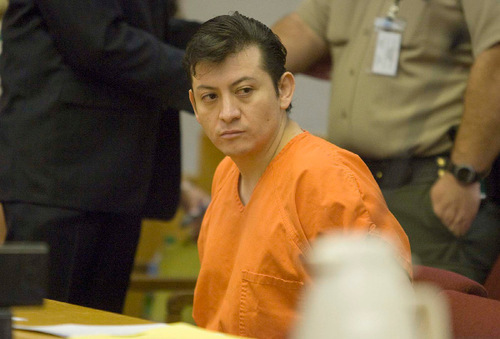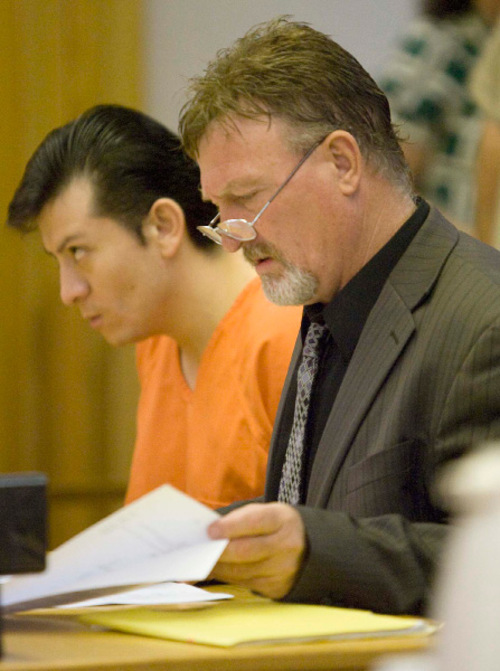This is an archived article that was published on sltrib.com in 2010, and information in the article may be outdated. It is provided only for personal research purposes and may not be reprinted.
Nephi • A jury late Thursday found Ruben Chavez-Reyes guilty of obstructing justice, burglarizing a storage shed and tampering with evidence in connection with the murder of a Millard County sheriff's deputy.
The five-woman, three-man panel acquitted Chavez-Reyes on charges of burglarizing a home and illegally possessing a firearm as an undocumented immigrant. The verdicts came after more than six hours of deliberation in a four-day trial.
Chavez-Reyes, 37, was accused of helping Roberto Miramontes Roman flee, first to Salt Lake City and later to Beaver, after Roman allegedly shot Deputy Josie Greathouse Fox on Jan. 5.
The burglary of a nonresidential building charge stems from Roman and Chavez-Reyes going into a storage shed in Beaver, where they were eventually arrested. The evidence-tampering charge was filed because Chavez-Reyes smashed his cell phone, prosecutors say, to avoid being tracked by police.
James Slavens, Chavez-Reyes' attorney, said he has asked 4th District Judge Donald Eyre to merge the burglary and evidence-tampering charges with the obstruction of justice. He said the two third-degree felonies were part of the obstruction of justice, which is a second-degree felony.
"They entered the shed because they were hiding from the police," Slavens said.
The judge will consider merging the charges; Chavez-Reyes will be sentenced in October. Chavez-Reyes could face 1 to 15 years in prison for obstructing justice, and up to five years in prison for each of the third-degree felonies.
Deputy Millard County Attorney Patrick Finlinson said he was satisfied with the verdict, even though there were two acquittals.
"It was a tough trial, and there were a lot of issues in the trial that had to be sorted out by the jury," Finlinson said.
Millard County Sheriff Robert A. Dekker said the verdict was a "solid step" toward getting justice for Fox.
"Now, we'll go to work toward the aggravated murder trial," Dekker said, referring to Roman's trial.
During arguments Thursday, Deputy Attorney General Patrick Nolan reminded jurors not to forget that the crimes centered on the Jan. 5 murder of Fox.
Nolan alleged that Roman began calling Chavez-Reyes at 1:03 a.m. Jan. 5, minutes after Fox's murder. He said records from Roman's BlackBerry phone showed 10 phone calls between then and 2 a.m. He said jurors should use common sense to infer what was said in those conversations.
Chavez-Reyes eventually drove to Nephi — where Roman was stuck in a snowbank in Chavez-Reyes' Cadillac — and drove Roman to a neighborhood in Salt Lake City, where the car was spotted, triggering a police response.
At that point, Chavez- Reyes could have done the right thing, Nolan said, but instead chose to shield Roman from the authorities.
"If an army of law-enforcement officers descends on a neighborhood looking for someone who killed a police officer … [Chavez-Reyes] could have turned to the police officers and said, 'I have nothing to do with this, I'm out of here,' " Nolan told jurors.
He said Chavez-Reyes admitted smashing his own cell phone, a move prosecutors said was done to keep police from using its GPS feature to track the fugitives.
Slavens said Chavez-Reyes did not obstruct justice when he drove Roman to Salt Lake City. At the time, he didn't know Roman was wanted for allegedly killing Fox, and was only helping a friend who said he had car trouble, Slavens said.
After learning what Roman did, Chavez-Reyes feared he could be killed by police, because Roman was driving his car at the time of the slaying and his fingerprints could be found on the gun. Slavens said Chavez-Reyes went along with Roman in hopes that police would sort things out and determine that he was not involved in the killing.
"His intent was not to help Roberto but to save his own ass," Slavens said.
He also challenged the burglary charge related to hiding in the home of Shirley and Kirk Cleverly. Slavens said Cleverly already admitted to lying in his first statement, when he said he let the men into his home. He said Cleverly changed his statement to avoid being charged with obstructing justice by harboring the men.
Chavez-Reyes destroyed the phone, Slavens said, to keep Roman from contacting any of Chavez-Reyes' friends and family for help. He said Chavez-Reyes wanted to keep them out of it.
Slavens said Chavez-Reyes' presence also saved lives. He said Roman did not harm anyone while Chavez-Reyes was with him, despite being accused of killing a police officer and supposedly claiming that he would not be taken alive.
Eyre granted Slavens one concession. Eyre allowed the jury to consider Chavez-Reyes' handling of an AK-47 rifle as "innocent possession" because of the question of whether Chavez-Reyes only held the gun as Roman loaded it into the trunk of the car before he left Chavez-Reyes' Fillmore home before the murder.





